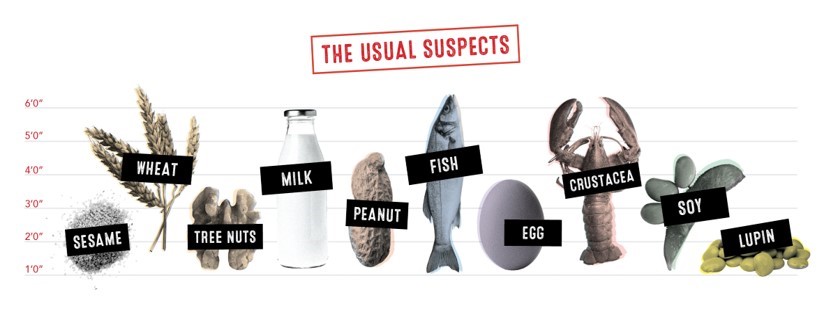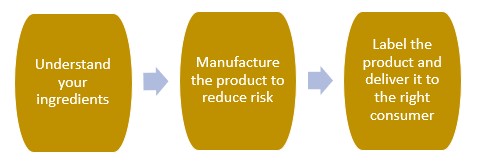Australia has the highest prevalence of food allergy in the world, and an increasing associated fatality rate. It’s estimated that food allergy occurs in around 10% of infants, 4-8% of children, and about 2% of adults in Australia and New Zealand.
For these consumers some foods (or their ingredients/components) can cause severe allergic reactions that require medical intervention and/or emergency hospital treatment.
To protect these consumers there are laws in place, such as mandatory product labelling, to help them identify potential food allergens and avoid certain foods.
Unfortunately, not every business gets it right, and sometimes food allergens go undeclared. This not only puts consumers at risk but can incur significant financial costs for the business.
Between 2018 and 2019 there were 187 food recalls in Australia, with 74 of these due to undeclared allergens (40%). This trend has continued in 2020, with 61 food recalls conducted between 1 January – 30 July, and 48% of them being linked to undeclared allergens.
The most common food allergens
The food allergens most likely to cause illness in children and adults are milk, peanuts , tree nuts, egg and cereals containing gluten. Other common allergens include sesame seeds, fish, crustacea, soy and lupins.

Your responsibility as a food business
The only way for people with a food allergy to manage their allergy is to completely avoid the food allergen.
For this reason, the Food Standards Code requires that for food produced or sold in Australia that contain any of the allergens mentioned above, the allergen be declared on product labels. This includes its presence as an ingredient, or its presence as a component of food additives or processing aids.
Allergen management and your food safety program
Food businesses are required to have an effective allergen management plan as part of their food safety program, should train their staff in food allergen risks, management and communication, should provide clear and accurate information on their products and manage the unintentional presence of food allergens. Their food safety program should include information on labelling, segregation and storage of ingredients and finished products to prevent cross-contamination.
An allergen management plan should consider the following:
- detailed information on all ingredients. This information may come from supplier specification, ingredient declarations or from Product Information Forms (PIFs). PIFs contain supplier contact details, production information including ingredients, compositional and other information that meets legal and regulatory compliance in Australia and New Zealand in a standardised manner. To find out more about PIFs visit the Australian Food and Grocery Council.
- appropriate storage and handling of ingredients and equipment to prevent cross contact
- segregation of ingredients and or lines or scheduling to avoid cross contact. In some instances, this may require having separate production lines to mitigate risk
- appropriate and effective cleaning to remove allergens from surfaces and equipment
- a testing schedule to test raw ingredients, environmental surfaces and finished products. Further information on allergen testing can be found here at Allergen Bureau food allergen analysis
- staff training in food allergen risks and management, including the unintentional presence of food allergens. A free presentation on Food Allergen Fundamentals is available at Food Allergen Fundamentals
- a review of your product labels to ensure compliance with the Food Standards Code.

What to do if you suspect an undeclared allergen may be present in your products
If you suspect that a product may contain an undeclared allergen, it’s important to act swiftly and rectify the issue. The following activities should be undertaken:
- Stop production of any products believed to be implicated immediately. Isolate any existing batches to ensure they are not distributed any further.
- Contact your state regulator to discuss the issue, corrective actions required and whether a trade withdrawal or a product recall is necessary.
- Refer to your food safety program for nominated corrective actions.
- Review your processes and identify the root cause of the issue.
- Use allergen analysis to assist in investigating the issue where appropriate. This may include the analysis of raw materials, surfaces and finished product.
- Review your ingredients list to ensure it accurately reflects the ingredients that have been used in production.
- Review and update your product labels, including the allergen declarations, to ensure they comply with legal requirements.
By being proactive and having an effective allergen management plan in place, you’ll not only help protect consumers with life threatening allergies, but also prevent the risk of having to undertake a food recall. Food recalls can incur significant financial costs, cause reputational damage and risk potential litigation for food businesses.
Helpful resources
Food Standards Australia New Zealand (FSANZ) – Allergen resources including labelling requirements for food processors and the food services sector. Food Standards Code – Standard 1.2.3 and 1.2.4 and 1.2.8 are particularly helpful.
Queensland Health – Information on food labelling requirements, including allergens.
Allergen Bureau – provides Industry best practise information ,resources, practical tools and industry contacts for the better management of food allergens. Australian Food and Grocery Council – Guidance for the food industry (the Food Industry Guide to Allergen Management and Labelling) about allergen management and labelling including Precautionary statements
Dairy Food Safety Victoria – A guide to managing allergens in the dairy industry
Allergy & Anaphylaxis Australia – Information and resources for consumers and food businesses including an allergen checklist.
Australian Department of Agriculture, Water and Environment – Information for exporters on importing country requirements.
Training for food businesses – a free resource for training on Food Allergen Fundamentals from the Allergen Bureau
Training for food service Free food allergy training courses for the food service industry
The Food Recall Process in Australia – free online training for dairy manufacturers on how to handle a food recall in their business. Developed by Safe Food Production Queensland on behalf of Dairy Australia.
Proposal to change the Food Standards Code
FSANZ are currently working on a proposal to make allergen labelling requirements clearer and more consistent. More information is available: P1044 – Plain English Allergen Labelling
